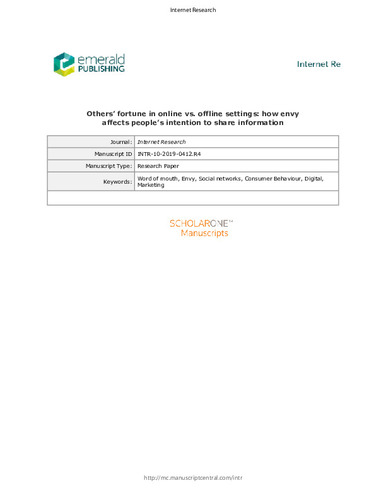Others’ fortune in online vs offline settings: how envy affects people’s intention to share information
Autor(es) y otros:
Palabra(s) clave:
envy
social networks
consumer behaviour
digital marketing
Fecha de publicación:
Versión del editor:
Citación:
Resumen:
This paper fills a gap in the existing literature by answering the following question: is the effect of envy on people’s intention to share information the same in offline settings and on online social networks? Two studies demonstrate (1) how envy that results from upward social comparisons affects people’s intention to share information and (2) the difference between online and offline settings. The likelihood of sharing information susceptible of triggering envy is lower on online social networks than in an offline scenario. In digital environments, feelings of envy depend on the number of social comparisons that the individual is exposed to. This research recommends (a) incorporating tools that allow online social network users to feel part of their network’s successes, (b) promoting offline diffusion of information, and (c) encouraging people to play an active role when using online social networks. To date the literature has paid no attention to envy as an engine of information sharing. This aspect is especially relevant when discussing platforms whose main goal is precisely information sharing and that offer fertile ground for upward social comparisons.
This paper fills a gap in the existing literature by answering the following question: is the effect of envy on people’s intention to share information the same in offline settings and on online social networks? Two studies demonstrate (1) how envy that results from upward social comparisons affects people’s intention to share information and (2) the difference between online and offline settings. The likelihood of sharing information susceptible of triggering envy is lower on online social networks than in an offline scenario. In digital environments, feelings of envy depend on the number of social comparisons that the individual is exposed to. This research recommends (a) incorporating tools that allow online social network users to feel part of their network’s successes, (b) promoting offline diffusion of information, and (c) encouraging people to play an active role when using online social networks. To date the literature has paid no attention to envy as an engine of information sharing. This aspect is especially relevant when discussing platforms whose main goal is precisely information sharing and that offer fertile ground for upward social comparisons.
ISSN:
Patrocinado por:
The authors would like to thank the Ramón Areces Commercial Distribution Chair for financing a mobility grant of Dr. Suárez a visiting scholar at the Robert H. Smith School of Business of the University of Maryland on early stages of this project. Dr. Chica was supported by the Ramón y Cajal program [RYC‐2016‐19800]. This work was also supported by the project SIMARK [PY18‐TP‐4475] granted by the Andalusian Government and by the University of Oviedo [PAPI‐19‐EMERG‐15].
Colecciones
- Administración de Empresas [514]
- Artículos [37556]
- Investigaciones y Documentos OpenAIRE [8424]
Ficheros en el ítem





